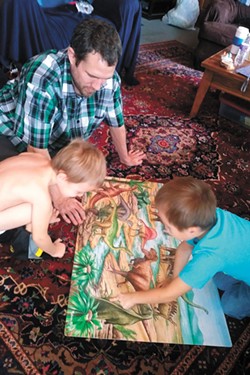The banging thunders through Joe Riley's house. Boom, boom, boom. Riley has no clue who it could be. His wife and kids are relaxing in the other room as he opens the front door.
Two detectives are outside.
"What's going on?" Riley asks.
The Spokane County sheriff's detectives tell him why they're there. It's Jan. 2, 2020, four days after a brutal assault left a man unconscious in a pool of blood outside Ichabod's East, a bar in Spokane Valley. Daniel Jarman, 40, would die from the beating, and the attacker fled into the night before police arrived. Days later, two women would tell detectives they figured out who was responsible for the vicious attack: Joe Riley, a guy who owns a tattoo shop at the Valley mall.
The two women were wrong. Riley had nothing to do with it. But the detectives at Riley's front steps don't know it yet.
Detective Marc Melville, an Air Force veteran wearing plain clothes and a dark jacket, asks Riley to step outside. Melville tells Riley about the investigation and asks where he was at 2 am on Dec. 29. Riley tells the truth: He was at home with his wife.
Melville looks at Riley's hands. No bruises or cuts of any kind. No evidence that they'd been used to beat a man to death.
Melville, for the moment, is stumped. Why would those two witnesses tell him that it was Joe Riley? Melville steps away and makes a call to one of the witnesses, asking once again for a physical description of the suspect, investigative records show. The woman repeats it. Melville glances again at Riley. The description fits.
Riley is placed under arrest. While he's being handcuffed, Riley sees his four kids' faces plastered against the window. He catches his wife's look of utter horror.
There is no other evidence against Riley — only the word of two witnesses who found him on Facebook and thought he looked like the killer, investigation notes indicate. That was enough for the detectives.
Riley's only real crime was looking like someone else — like the man whom investigators would later identify as the real killer. Riley and that man have the same eyes and smile. Both have a stocky build, chin hair and tattoos. They're nearly the same age, born just two months apart.
But there's one glaring difference: One evidently beat a man to death. The other was arrested for it.
As Riley is locked behind bars, as he's labeled a murderer, as he's forced to prove his innocence, as he's later cleared of wrongdoing, as the case is closed and Riley is left to restore his good name, the real killer escapes justice, never once answering for the evidence against him.
A SOLDIER FINDS HIS FOOTING
The night Daniel Jarman would lose his life begins with him feeling hopeful. On Saturday, Dec. 28, 2019, Jarman is drinking water at an Outback Steakhouse bar with one of his buddies, witnesses later recalled. He can't contain his excitement because he's just bought a house in Spokane Valley that will allow him to spend more time with his kids.Some girls sitting at the bar tell him he should celebrate with a beer. Jarman knows he shouldn't. Mixed with his prescription medication, alcohol hits him much harder than other people.
It brings out things he'd rather forget.
Jarman grew up just north of Seattle and, like his two young sons, he loved playing soccer as a kid. When he graduated from high school, he decided he wanted to be a chef. He joined the Army because it would help pay for school — not expecting war. But he signed up just weeks before 9/11 and ended up serving multiple tours in Afghanistan and Iraq. He wasn't quite the same afterward.
"He came home with some problems," says his mother, Janet Jarman.
After serving in the Army, he graduated from Western Washington University and worked in banking. In 2009, he met a woman named Natasha Clark. They were set up by their friends and immediately hit it off. Clark loved his smile, and remembers how polite and gentlemanly he was. They had their first son together in 2012, and their second two years later.
But part of Jarman was suffering. While he didn't talk about it too much, he was haunted by war. Once, he told Clark, he witnessed one of his friends get shot in the head right in front of him.
Eventually, he got treatment for PTSD and bipolar disorder. It helped. The VA gave him medication — but he wasn't supposed to mix it with alcohol, so he stopped drinking.
He and Clark split up in 2016, she says. She moved to Soap Lake, while Jarman lived in Curlew. It wasn't ideal — Jarman got tired of always having to pick up his sons and drop them off again. He wanted to be with them all the time.

So at the end of 2019, he bought a house in Spokane Valley and proposed a deal to Clark: He could live downstairs, and she could live upstairs. But at least the kids would be there.
She agreed.
"I had already moved half of my stuff over there," Clark says.
That weekend, on Dec. 28, Jarman was moving into his new house, beginning his new life. It's why, at Outback Steakhouse that Saturday night, Jarman is in a celebratory mood.
He drinks a beer. The first beer is followed by another and another, and everything becomes a blur and then suddenly, eight hours later, he finds himself in the backseat of a car, next to some guy in a dark, puffy jacket.
In the front seats of the car sit the bartender from Outback and her friend, who are trying to figure out what to do with Jarman, who's very drunk and ready to pass out. The guy next to him suggests just leaving Jarman there — he can figure out how to get home on his own, witnesses recall. They all argue.
Jarman and the other guy step out of the car.
A blurry, choppy surveillance video captures what happens next, frame by frame. In one frame, the two are facing each other, maybe 5 feet apart. Jarman appears much thinner. In the next frame, the man wearing the dark jacket has lunged at Jarman and appears to be in the follow through of a right-handed swing. Jarman's head is cocked back and to the side following the hit. Both fall out of the frame. Seconds later, a handful of onlookers are there surrounding the spot where Jarman lay.
The Outback bartender, still in the front seat of the car, sees it all. She'd later describe it to detectives in detail: The guy knocked Jarman "out cold," then "sat there and just wailed on his face" at least a dozen more times, all within seconds.
She calls 911 at 1:58 am, reporting that "some guy just got punched a whole bunch of times," and adding that he's bleeding and unresponsive. A man takes the phone from her and says "she's wrong," Jarman "fell on the ground because he's drunk." But he begs for someone to help this man, choking on his own blood.
The bartender takes the phone back.
The dispatcher asks, "Who punched him?"
"I have absolutely no idea," the bartender says. "He hit him and took off, and we have no idea who it was."
For days, Jarman is in critical condition at Sacred Heart Medical Center with a section of his skull removed. His entire face is swollen, he has blood caked to his cheek and a ventilator is keeping him alive. Friends and family have a difficult time seeing him like this.
On Jan. 3, Jarman's mother, Janet, has to make the worst decision of her life. Doctors say her son won't be able to recover. She agrees to take him off life support.
The decision rips her apart.
"A mommy shouldn't have to do that," she says.
She calls 911 at 1:58 am, reporting that "some guy just got punched a whole bunch of times," and adding that he's bleeding and unresponsive.
tweet this
PEGGED BY PROFILE PICTURE
The Spokane County Sheriff's Office had no leads on Jarman's killer in the hours after he was beaten in the parking lot. None of the witnesses — not even the two women in the car with the guy — say they know who did this to Jarman.On Monday, Dec. 30, Detective Melville is assigned to lead the case.
Melville, who declined to comment for this article citing pending litigation, calls the bartender from Outback Steakhouse who witnessed the incident. We'll call her Witness A. She now says she knows who punched Jarman: A guy named Joe Riley who works at Speakeasy Tattoo at the mall. She didn't know who it was days ago, but she says she found him on Facebook and thinks it's him.
Melville interviews Witness A and later her friend, Witness B. The Inlander obtained audio of the interviews. We are withholding their names because the women fear for their safety with the killer out free.
Witness A, the bartender, describes how after work, she ended up at Ichabod's late at night. There, she was talking to Jarman, who had been with her all night. She says her friend, Witness B, was talking to another guy — "this guy, Joe, that she knew," as Witness A puts it.
Her friend and this guy "Joe" followed her and Jarman to her place. Jarman looked like he was going to pass out on the couch, however, so they all got back in one car to take him home. But first, they stop at Ichabod's because one of the girls forgot a jacket. That's where they get in an argument, the two guys step out, and Jarman is dropped with one punch.
To be clear, this witness refers to this other guy as "Joe" when speaking to detectives on Dec. 31 because, by that point, she'd been convinced that they found him on Facebook. At no point in this recorded interview with two detectives does she describe being told this guy's name was "Joe" on that night.
Witness B more explicitly denies knowing the guy as "Joe" when she saw him that night. She, too, believes the killer is Joe Riley days after the assault, but only because of his Facebook page.
Melville then presses her, misrepresenting what Witness A told him just hours earlier.
"She said that you saw him coming and [said], 'Hey this is Joe, he does tattoos,'" Melville says, though Witness A didn't actually say that in the interview.
Witness B holds firm.
"Yeah, no, I don't remember ever saying, 'this is Joe,' like, at all," she responds.
Melville continues to pressure her, telling her that he doesn't think she's telling the entire truth. He asks her "what's more important: A friendship, or a life?" He brings up that Jarman is in awful shape at the hospital, in a medically induced coma, and that he may die. She gets upset.
"You understand this could turn into a homicide investigation, not just an assault?" Melville says.
"Yes."
"Somebody could end up getting charged with manslaughter, murder," Melville says.
She understands, she says.
"And you understand that people who lie to us, or try to point us in the wrong direction, can be charged as an accessory?"
"Yes, of course."
He asks again if there's anything she can tell him.
Still, she never tells him she knew the suspect's name the night of the incident. But she wants the potential killer to be caught. She really believes that guy she found on Facebook is the same guy she saw at the bar, so she says what she can.
"I know it's Joe," she says.
Days go by, New Year's Day passes, and there's no more evidence against Joe Riley. But rumors were circulating. Riley was getting weird, nasty comments on his Facebook page from people who knew Jarman. On Jan. 2, records say, Melville checks Riley's Facebook and sees two of these comments.
Melville decides to act. It's then that the detectives go knock on Riley's door and arrest him in front of his family.
The next day, Jan. 3, Riley's bond is set at $150,000. The affidavit of facts, signed by Melville, states that "[Witness B] introduced Joseph as 'Joe'" to her friend. Neither woman described that happening in the interviews obtained by the Inlander.
The Spokane County Sheriff's Office attempts to build a case against Riley over the next few days and weeks. But there is no case to be made. There are no receipts proving Riley was at Ichabod's. A bartender working the night of the beating says she knows Riley, and he wasn't there that night. Still, Riley remains in jail for two weeks before he makes bail.
Doug Phelps, Riley's attorney, called the arrest of his client "terrible police work."
"They ignored all the evidence that pointed away from Joe," Phelps says.

UNRELIABLE WITNESSES
It's not uncommon for eyewitnesses to identify the wrong person, criminal experts say. In fact, it factors into more than 70 percent of convictions overturned through DNA evidence in the U.S., according to the Innocence Project, a national nonprofit that works to free innocent people.But Riley's case is unique, says Jim Petro, former attorney general of Ohio and author of False Justice: Eight Myths that Convict the Innocent. Usually, wrongful identification occurs in a lineup where witnesses must choose the person matching their description out of several. Petro says he hasn't seen any cases where witnesses use social media to misidentify a guy they saw at a bar as a killer.
Petro, who worked with the Innocence Project in Ohio, says investigators should always be wary of arresting someone based on eyewitnesses alone.
"Eyewitness I.D. should never, without other support, be on its own considered adequate," Petro says.
He says the credibility of the two witnesses, the fact that Riley didn't have marks on his hands, and his lack of criminal history should have been red flags caught by investigators.
"They made a mistake," he says. "A mistake is a mistake."
He adds that the boss — Spokane County Sheriff Ozzie Knezovich — should require the investigators involved get additional training.
"If the leadership of the police department didn't take the mistake seriously, then they're at fault also," Petro says.
The Spokane County Sheriff's Office has faced intense scrutiny when previous investigations fell apart. In 2012, three men were released from prison after their convictions in an armed robbery were tossed out. That case wasn't based on a mistaken eyewitness, but a jailhouse snitch who gave false testimony. A sheriff's office sergeant said the detectives failed to corroborate the informant's statements, calling it "extremely poor police work." But Sheriff Knezovich, contradicting that sergeant, defended the investigation, arguing the detectives were thorough. The three men received $2.25 million in a settlement.
Knezovich tells the Inlander he can't comment much on the Jarman investigation, due to pending litigation. But he says he "most definitely" has confidence in Melville's abilities as a detective.
"Frankly, it was Melville's investigation, and continued investigation, that cleared the first suspect," Knezovich says.
Indeed, Riley made bail a couple weeks after his arrest, and by the end of January 2020, his first-degree assault charge had been dismissed. But Riley fears he was too close to being wrongfully convicted. Before his case was dismissed, he says prosecutors were telling him and his attorney that they had enough to put him in prison. At his arraignment, a prosecutor said the charge would likely be upgraded to second-degree murder.
And Riley doesn't credit detectives with clearing him. The assault charge was dropped only after Witness B called detectives back on Jan. 28 and said that she made a mistake and Joe Riley was the wrong guy. A friend showed the witnesses pictures of someone else named Jamie Peterson, records state, and as soon as the women saw it, their hearts sank, now believing Peterson was the guy.
Detective Melville knew of Peterson. In fact, according to Melville's investigation notes, he already knew Peterson was a dead ringer for Riley. There was a receipt from Ichabod's the night of Jarman's death in Peterson's name, and Melville had looked him up on social media and compared him to Riley, noting the similarities.
Peterson, 39, did not respond to calls, texts or voicemails seeking comment for this article. Nor did his friends and family members. At Peterson's Spokane Valley home, a block away from an elementary school, a woman answered and said he wasn't there. The Inlander left a note and business card there with contact information. Shortly before this article was published, Peterson blocked an Inlander reporter from seeing his Facebook and blocked the reporter's phone number.
A year ago, on Jan. 29, a day after Witness B pointed to Peterson, Melville called Peterson. The detective had found his phone number from a report that Peterson was in a bar fight months earlier. Peterson agreed to meet with Melville at a pizza place around lunchtime. Peterson acknowledged he was at Ichabod's bar the night of the fight but said he left just after midnight, when his receipt was printed. In fact, phone records pegged him in the area of Ichabod's as late as 2:03 am, minutes after the assault of Jarman.
Then Melville noticed something else: A "lasered off" tattoo on his left arm, exactly where one of the witnesses described one being on the suspect.
As investigators narrowed in on Peterson, they discovered that his involvement was something of an open secret among those connected to the bars near the crime scene. A bartender at nearby Sullivan Scoreboard answered a call from Melville in March. When she was told Melville was seeking someone who was involved in the fight, she replied, "You mean Jamie?"
Chad Kemp, a bouncer there who agreed to an interview with the Inlander, told Melville he didn't see what happened that night, but he heard about the incident shortly afterward. He says multiple people told him within a day that it was Peterson. One of those people was apparently an eyewitness.
Melville contacted that witness in March. The witness described to Melville how he saw Peterson on Dec. 29 standing over Jarman, saying something like, "He wanted to start shit, he wanted to keep running his mouth." When the Inlander contacted this witness, however, he denied ever speaking to a detective.
Nobody with information on Peterson, including this witness, volunteered to tell law enforcement. At least nobody but the two women allegedly in the car with him and Jarman that night.
Kemp says it's possible people are afraid of Peterson. Kemp knew him as someone who could cause problems at the bar. Peterson also has a felony on his record for making harassing phone calls more than a decade ago to his then-estranged wife. According to court documents, he threatened to hurt his wife's dad if Peterson's assault rifle wasn't returned, then later "threatened to kill" her entire family. Peterson's father, meanwhile, is Lee Peterson, an attorney with Craig Swapp & Associates, a prominent law firm specializing in personal injury cases. Lee Peterson did not respond to multiple phone calls and messages from the Inlander.
With Riley released and his charges dismissed, the investigation into Peterson slowed to a crawl, as detectives waited for DNA results from Witness B's car. Then, in August, Melville collected a DNA swab from Peterson, comparing it with the DNA sample found in the car. It was a match. Peterson had denied knowing those two women or Jarman, but his DNA had been found inside the same car that Jarman and his attacker are seen on video exiting at 2 am.
Considering there were now three witnesses identifying Peterson as the man who punched Jarman, along with DNA evidence and phone records proving he was there, the Spokane County Sheriff's Office recommended that Peterson be charged with second-degree manslaughter.
It wasn't enough. The Spokane County Prosecutor's Office declined to charge Peterson. The case was closed.
County Prosecutor Larry Haskell tells the Inlander that "in this case, the evidence supported a likely mutual combat or self-defense scenario... in addition, the prosecutor must evaluate potential problems with the case and make a judgment call on all foreseeable issues including credibility of the state's case."
Haskell did not answer follow-up questions asking if, after Riley was arrested and charged, new evidence supported a self-defense scenario for Peterson. He also did not say whether Riley's initial arrest, or the investigation itself, hurt the credibility of the state's case.
LYING TO PROTECT
When her husband went to jail for a crime he didn't commit, Shalee Riley didn't know what to tell the kids. She had to come up with something, so she said he had an emergency business call and he had to go away."I had to really hold it together," she says. "It's sad. I had to lie."
The whole experience has shaken their sense of security to this day. Joe now sleeps on the couch, in an effort to protect the family, and he often wakes up in a panic. They don't go out much, and not just because of the pandemic. They feel like they might get framed for a crime.
"We don't trust people. Things are not the same," Shalee says. "We can't believe this happened, and the justice system is like this."
Joe Riley says that he will still go to the grocery store and hear people call him a murderer. He's always explaining himself. His tattoo business has suffered.
He constantly wonders why this happened to him. He looked up Peterson, and he isn't so sure they look that much alike. Riley gets angry thinking about him at all.
"If it was self-defense, why wouldn't he turn himself in? Why did he willingly and knowingly let me sit in jail and make me take the fall and almost lose my entire life, if he's so freaking innocent?" Riley says.
Jarman's family has similar questions. His sister, Jami Humphries, doesn't understand why Riley was charged but Peterson wasn't.
"The thing that frustrates me the most is them saying that it was self-defense," she says. "I believed in the system until this."
Jarman's loved ones are still seeking justice. They won't accept that the case is closed with no charges. His mom, Janet, says she still cries for him every day. Maybe he shouldn't have been out drinking that night, she says, but she's pretty sure he wasn't planning on getting killed doing it.
"He was a good guy. Troubled. But a good guy," she says. "He was getting better all the time."
His kids, 6 and 8 years old, never got to move into the Spokane Valley house with their mom and dad. Clark instead moved them back to Soap Lake. They miss their dad. They were told that he was in an accident and died.
She hasn't told the boys what really happened yet.
"I know when they're age appropriate, I'm going to have to tell them the actual truth," Clark says.
How will she tell them their dad's killer got away with it? ♦
















